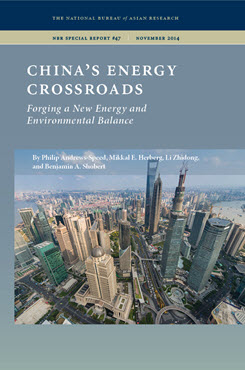China's Energy Policymaking Processes and Their Consequences
This essay examines the dynamics of China’s energy policymaking and how differences in the context and processes for various initiatives ultimately shape their implementation and potential for success.
EXECUTIVE SUMMARY
This essay examines the dynamics of China’s energy policymaking and how differences in the context and processes for various initiatives ultimately shape their implementation and potential for success.
MAIN ARGUMENT
China faces a number of severe energy challenges, relating notably to energy supply security and environmental cost, as well as to investment efficiency and social equity. With this in mind, the Xi Jinping government has inherited or launched several important policy initiatives that aim to reshape the country’s energy portfolio and that directly affect the energy sector. These initiatives include efforts to advance the continued reduction of energy intensity and carbon emissions, the radical reduction of air pollution, the reform of state-owned enterprises (SOE), and the reform of the pricing systems for energy products. Considered collectively, these policy initiatives involve quite different sets of strategies to achieve their ultimate goals. Such differences ultimately shape how various programs are implemented and suggest likely intended (and unintended) consequences based on observations of past efforts.
POLICY IMPLICATIONS
- China’s Action Plan for the Prevention and Control of Air Pollution outlines a series of ambitious goals for the industrial sector, and addressing air pollution is a high priority for the Xi government. To be successful, this plan will need to be supported by a number of measures, including strategies for the power sector, for identified industries, and for key regions. Yet success will also require longer-term structural and policy shifts inside China, which will be more challenging for policymakers to achieve.
- To date, China’s energy sector reforms have had the desired consequences of raising money, transforming management incentives, improving technical and commercial performance, and creating the basis for international expansion. However, the government has undertaken only limited steps to develop competition within domestic oil and gas markets, which will be needed to further advance the sector’s reform.
- While the Chinese government’s ambition to introduce carbon trading is to be applauded, effective implementation faces a number of serious obstacles. Ultimately, these trading experiments are unlikely to bring about significant emissions reductions without a concurrent loosening of state controls on SOE ownership and energy pricing.
Philip Andrews-Speed is a Principal Fellow at the Energy Studies Institute of the National University of Singapore.


